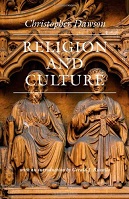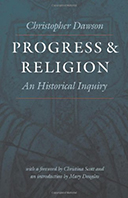This work consists of a collection of essays written for a number of publications such as the Sociological Review and the Dublin Review. The book was first published in 1933 and covers a broad range of topics, as can be seen from a sample of the essay titles: The New Leviathan, Rationalism and Intellectualism, Islamic Mysticism and The Nature and Destiny of Man.
Central Themes
In the essay entitled Cycles of Civilisation, Dawson discusses the life-cycle of a civilisation by sweepingly examining four major world cultures – the European, Islamic, Indian and Chinese. He seeks to show that when these cultures possessed a synthesis between their particular religion and their society, an inner unity prevailed within them. “But as soon as [this synthesis] begins to decline, the civilisation itself undergoes a process of rapid social change, and this continues until a new synthesis reintegrates civilisation on a new plane.”
In Religion and Life, Dawson argues that the dissatisfaction of the modern age cannot be remedied by material solutions alone, claiming that “what our civilisation lacks is not power and wealth and knowledge, but spiritual vitality”. After briefly analysing the world view of Eastern religions, he then provides the reader with a remarkable 5-page tour of the religious history of the West – from St. Paul to the dividing of Christendom at the Reformation, and from there to the rise of rationalism, the Christianity of William Blake and Charles de Foucauld. Following this survey, Dawson calls for a revitalised Christianity based on “a new asceticism suited to the new conditions of the modern world”. “What the world needs”, he says, “is not a new religion, but a new application of religion to life”.
Evaluation of the Work
In this collection of essays one can experience to the full Dawson’s characteristic combination of masterful historical overview with his own analyses and views on a wide range of subjects, from the relative merits of other religions and Christianity to the application of the lessons of history to the modern age. Muslims and Buddhists may disagree with him on his perceptions of their doctrines and the uniqueness of Christianity – as Bede Griffiths did with regard to Hinduism – but no reader will be able to complain of a lack of intellectual stimulation and many will agree with his analysis of the failure of rationalism and materialism to fulfil the needs of the human soul.
PRAISE FOR THE LATEST EDITION:
“This volume may be an even better example of his genius than his best-known books such as Progress and Religion, The Making of Europe and Religion and the Rise of Western Culture.” – Robert Royal



